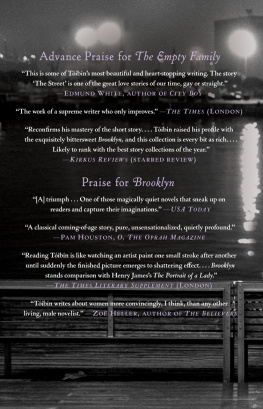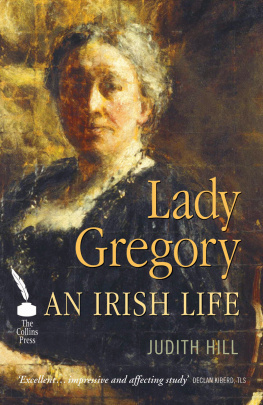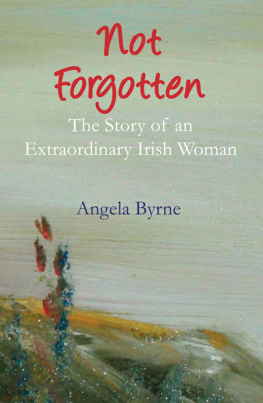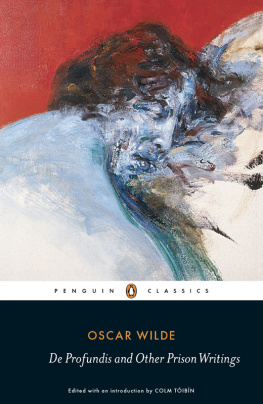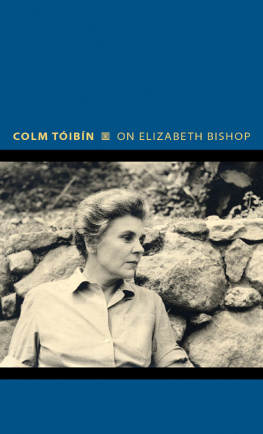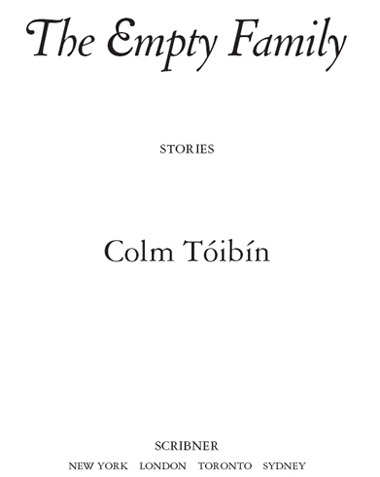
Also by Colm Tibn
FICTION
The South
The Heather Blazing
The Story of the Night
The Blackwater Lightship
The Master
Mothers and Sons
Brooklyn
NONFICTION
Bad Blood: A Walk Along the Irish Border
Homage to Barcelona
The Sign of the Cross: Travels in Catholic Europe
Love in a Dark Time: Gay Lives from Wilde to Almodvar
Lady Gregorys Toothbrush
All a Novelist Needs: Colm Tibn on Henry James
PLAY
Beauty in a Broken Place

SCRIBNER
A Division of Simon & Schuster, Inc.
1230 Avenue of the Americas
New York, NY 10020
www.SimonandSchuster.com
This book is a work of fiction. Names, characters, places, and incidents either are products of the authors imagination or are used fictitiously. Any resemblance to actual events or locales or persons, living or dead, is entirely coincidental.
Copyright 2011 by Colm Tibn
All rights reserved, including the right to reproduce this book or portions thereof in any form whatsoever. For information address Scribner Subsidiary Rights Department, 1230 Avenue of the Americas, New York, NY 10020.
First Scribner hardcover edition January 2011
SCRIBNER and design are registered trademarks of The Gale Group, Inc., used under license by Simon & Schuster, Inc., the publisher of this work.
The Simon & Schuster Speakers Bureau can bring authors to your live event. For more information or to book an event contact the Simon & Schuster Speakers Bureau at 1-866-248-3049 or visit our website at www.simonspeakers.com .
Manufactured in the United States of America
1 3 5 7 9 10 8 6 4 2
Library of Congress Control Number: 2010032931
ISBN 978-1-4391-3832-8
ISBN 978-1-4391-4983-6 (ebook)
Some of the stories in this collection have appeared elsewhere. See page 277.
For Anthony Cronin
Contents
The Empty Family
Silence
34 DVG, January 23d, 1894
Another incidentsubjectrelated to me by Lady G. was that of the eminent London clergyman who on the Dover-to-Calais steamer, starting on his wedding tour, picked up on the deck a letter addressed to his wife, while she was below, and finding it to be from an old lover, and very ardent (an engagementa rupture, a relation, in short), of which he never had been told, took the line of sending her, from Paris, straight back to her parentswithout having touched heron the ground that he had been deceived. He ended, subsequently, by taking her back into his house to live, but never lived with her as his wife. There is a drama in the various things, for her, to which that situationthat night in Parismight have led. Her immediate surrender to some one else, etc. etc. etc.
from The Notebooks of Henry James
S ometimes when the evening had almost ended, Lady Gregory would catch someones eye for a moment and that would be enough to make her remember. At those tables in the great city she knew not ever to talk about herself, or complain about anything such as the heat, or the dullness of the season, or the antics of an actress; she knew not to babble about banalities, or laugh at things that were not very funny. She focused instead with as much force and care as she could on the gentleman beside her and asked him questions and then listened with attention to the answers. Listening took more work than talking; she made sure that her companion knew, from the sympathy and sharp light in her eyes, how intelligent she was, and how quietly powerful and deep.
She would suffer only when she left the company. In the carriage on the way home she would stare into the dark, knowing that what had happened in those years would not come back, that memories were no use, that there was nothing ahead except darkness. And on the bad nights, after evenings when there had been too much gaiety and brightness, she often wondered if there was a difference between her life now and the years stretching to eternity that she would spend in the grave.
She would write out a list and the writing itself would make her smile. Things to live for. Her son, Robert, would always come first, and then some of her sisters. She often thought of erasing one or two of them, and maybe one brother, but no more than one. And then Coole Park, the house in Ireland her husband had left her, or at least left their son, and to which she could return when she wished. She thought of the trees she had planted at Coole, she often dreamed of going back there to study the slow progress of things as the winter gave way to spring, or autumn came. And there were books and paintings and how light came into a high room as she pulled the shutters back in the morning. She would add these also to the list.
Below the list each time was blank paper. It was easy to fill the blank spaces with another list. A list of grim facts led by a single inescapable thoughtthat love had eluded her, that love would not come back, that she was alone and she would have to make the best of being alone.
On this particular evening, she crumpled the piece of paper in her hand before she stood up and made her way to the bedroom and prepared for the night. She was glad, or almost glad, that there would be no more outings that week, that no London hostess had the need for a dowager from Ireland at her table for the moment. A woman known for her listening skills and her keen intelligence had her uses, she thought, but not every night of the week.
She had liked being married; she had enjoyed being noticed as the young wife of an old man, had known the effect her quiet gaze could have on friends of her husbands who thought she might be dull because she was not pretty. She had let them know, carefully, tactfully, keeping her voice low, that she was someone on whom nothing was lost. She had read all the latest books and she chose her words slowly when she came to discuss them. She did not want to appear clever. She made sure that she was silent without seeming shy, polite and reserved without seeming intimidated. She had no natural grace and she made up for this by having no empty opinions. She took the view that it was a mistake for a woman with her looks ever to show her teeth. In any case, she disliked laughter and preferred to smile using her eyes.
She disliked her husband only when he came to her at night in those first months; his fumbling and panting, his eager hands and his sour breath, gave her a sense that daylight and many layers of clothing and servants and large furnished rooms and chatter about politics or paintings were ways to distract people from feeling a revulsion towards each other.
There were times when she saw him in the distance or had occasion to glance at his face in repose when she viewed him as someone who had merely on a whim or a sudden need rescued her or captured her. He was too old to know her, he had seen too much and lived too long to allow anything new, such as a wife thirty-five years his junior, to enter his orbit. In the night, in those early months, as she tried to move towards him to embrace him fully, to offer herself to his dried-up spirit, she found that he was happier obsessively fondling certain parts of her body in the dark as though he were trying to find something he had mislaid. And thus as she attempted to please him, she also tried to make sure that, when he was finished, she would be able gently to turn away from him and face the dark alone as he slept and snored. She longed to wake in the morning and not have to look at his face too closely, his half-opened mouth, his stubbled cheeks, his grey whiskers, his wrinkled skin.
Next page
